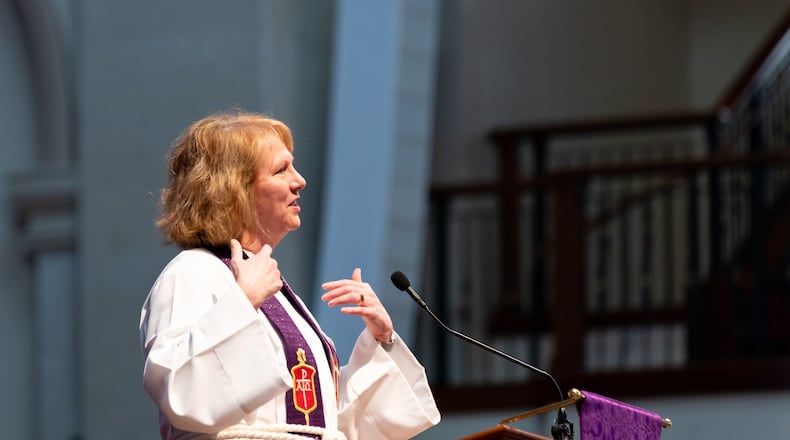The Trustees of the North Georgia Conference of the United Methodist Church have asked Cobb County Superior Court to pave the way for the entity to seize control of the assets of Mt. Bethel United Methodist Church.
The east Cobb church has been embroiled in a monthslong dispute with the conference over who should lead the congregation. The church has announced its intention to disaffiliate with the denomination, with Mt. Bethel and the conference moving in different directions even before the leadership dispute.
At issue is the reassignment of its prominent senior pastor, the Rev. Jody Ray, who served in that capacity for more than five years. Bishop Sue Haupert-Johnson announced this spring that Ray would be appointed to a new assignment on the conference staff related to racial reconciliation.
Ray, who is currently CEO and lead preacher of Mt. Bethel, alleges the conference did not follow the appropriate process and said he did not want the new job, but would rather stay at Mt. Bethel.
In July, the conference announced it had entered into a mediation process with Mt. Bethel that included Mt. Bethel Christian Academy. Those talks failed.
“While the conference and its representatives have engaged in negotiations with local church officials and have made good faith efforts to resolve the issues without litigation, the current situation has not changed and it is untenable,” according to the conference’s website. “The conference board of trustees will continue to take all necessary and appropriate actions to ensure compliance with the tradition and the Book of Discipline of The United Methodist Church.”
In a statement to The Atlanta Journal-Constitution, Mt. Bethel’s executive committee said they were “deeply saddened” that the parties were unable to come to a mediated solution.
“We have been watching and praying for the final passage of the Protocol for Reconciliation and Grace through Separation when a special General Conference can finally take place (in fact, had the Protocol been passed in 2020 as originally envisioned prior to the pandemic, Mt. Bethel would have already parted ways with an increasingly progressive post-separation UM Church),” according to the statement. “Bishop Haupert-Johnson sees a different future, and she is entitled to her beliefs. Our beloved church is now simply asking for its voice to be heard; let us vote on disaffiliation. Give our members a chance to speak to the heart of our faith and stake a claim for the future of Mt. Bethel Church.”
L. Edward Phillips, an associate professor at Emory University’s Candler School of Theology, said he feared the two parties would not find a resolution through mediation.
The denomination has been in a state of flux for some time over LGBTQ-related issues. The divisions are likely to split the church between more traditional and conservative congregations and those that are more progressive.
In related news, the Southeastern Jurisdiction Committee on Episcopacy and the Southeastern Jurisdiction College of Bishop determined that Haupert-Johnson acted in compliance with the denomination’s Book of Discipline when she reassigned Ray to a position within the conference administration.
The Book of Discipline outlines the law, procedures, doctrine, administration and organizational work of the United Methodist Church.
As a result, the complaints against the bishop by the Mt. Bethel UMC Executive Committee were dismissed, according to the conference’s website.
The complaints allege disobedience to the order and discipline of the UMC and, specifically, against Haupert-Johnson for “relationships and/or behaviors that undermines the ministry of another pastor,” according to a previous statement from Mt. Bethel. Another complaint was filed against Central West District Superintendent the Rev. Jessica Terrell with the annual conference.
The status of that complaint could not be determined at press time.
United Methodists represent one of the largest mainline denominations with more than 13 million members worldwide, including nearly 7 million in the U.S. and more than 467,000 in Georgia.
About the Author
Keep Reading
The Latest
Featured


